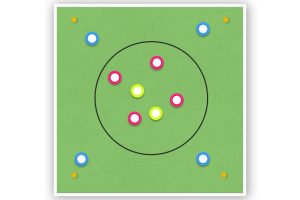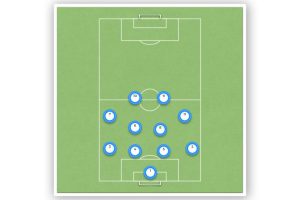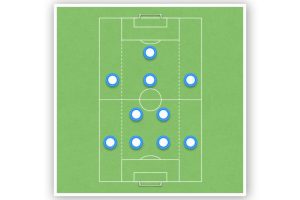Soccer Coaching for Beginners: A Step-by-Step Guide
Whether you’re a parent looking to teach your child the basics of soccer (or you’ve been roped into coaching this year) or coaching an adult non-league or pub-league side, coaching soccer can be a fun and rewarding experience.
However, knowing where to start can be difficult if you’re new to coaching. This article will provide a step-by-step guide for beginners on how to coach soccer effectively, including tips on drills, practice plans, and strategies for game day.
This article has information for junior coaches and those interested in coaching a soccer team at the senior level.
By following the guidance in this guide, you’ll be well on your way to becoming a successful soccer coach in no time.
This guide is more than just drills and coaching. Consider it tips and advice to be an effective coach.
Coaching Youth Soccer 101
Are you looking to coach youth soccer? There is always plenty of opportunities from the grass-root to the academy and pro-academy level.
This part of the article will look at coaching youth soccer – especially if you’re a new coach.

Soccer Coaching for Beginners: A Step-by-Step Guide
- Have a Positive Attitude – A good coach should be passionate about the game and be upbeat even when faced with adversity. This can also help players remain focused on the task at hand.
- Make Sure Everyone is On the Same Page – Before beginning a practice or match, make sure everyone knows their roles and expectations. This will help avoid confusion and ensure everyone is on the same page.
- Teach Your Players to be Self-Reliant – Encourage players to think for themselves and make decisions independently rather than simply following instructions or relying solely on a coach for guidance.
- Make Practices Fun and Engaging – Make sure your practices are enjoyable for all involved by incorporating different activities and drills that promote skill development and team bonding. Youth soccer drills are supposed to be fun and a way for players to learn soccer skills.
- Be Vocal – When instructing the field, remain vocal to ensure players are aware of what’s happening around them. Keep the age of your players in mind – if you’re shouting instructions to young players, they don’t learn the game; they learn to do what you tell them. Eventually, you want your players to make those decisions without your input, so let your players make mistakes.
- Emphasize Good Behavior– While you don’t necessarily need to be overly strict, ensure that all players abide by proper soccer etiquette, such as not arguing with the referee or using foul language. That is not only for players – we’ve all seen parents on the sideline show… let’s just say less than desirable behavior in youth sports. Don’t be that guy.
- Set Goals – Set clear and attainable goals for your team, so everyone knows what is expected of them. Your goals don’t need to be tied to results; they can be how individuals perform and improve.
- Monitor Players’ Progress – Keeping track of each player’s progress can help coaches identify areas where improvement is needed and make necessary adjustments to ensure success. Don’t go over the top with intense spreadsheets and data if you can’t keep it up – when it comes to player development, it’s best to be consistent.
- Offer Positive Reinforcement – To keep players motivated, coaches should give positive feedback whenever possible and offer encouragement when it is warranted.
- Manage Expectations – Be realistic in terms of setting expectations for the team while also ensuring they are challenging and enjoyable.
5 Tips for a First-Time Soccer Senior Soccer Coach
One of the main reasons I took over this site was the lack of resources for senior coaches. Here’s some information for a new head coach of a senior siccer team.
- Find effective ways to manage adult player expectations – Depending on the level you’re coaching, your players will have different expectations. You might be at a non-competitive team where the main goal is to have fun, or you might be a coaching in the non-league system where the aim is to win games (and titles). Find out what the players are looking for, and make sure it matches what your club is looking for. I’ve had to turn down great players before because they wanted something a little less competitive than we offered. Every soccer player has their own motivations.
- Try create a culture of professionalism in semi-pro and non-league soccer – It’s important, if you’re at a club looking to win games, to make sure the players are being as professional as they can. Now, depending on your level, you might be paying players – but often, it’s players playing for free. It’s vital to ensure your players are aware of the commitments involved in playing at your level and look for players that fit that mentality. Often, the team that’s the most committed and structured at lower divisions performs well.
- Create an effective game plan for adult players – When coaching adult players, you need to structure your game plan around the players you’ve got. Let’s be honest, this isn’t Football Manager and you can’t just go out and sign a player to fill a gap in your team. It’s more like an old episode of Ready, Steady, Cook where you’ve got to make something from the ingredients you’ve been given.
- Find effective ways to manage adult player availability – There’s plenty of apps out there, or you can use a Facebook group. Whatever you decide on though, make sure there’s a way to manage player availability. You need to know who is and more importantly isn’t available for games.
- The importance of effective communication with adult players – It’s important to communicate with your senior team. make sure everyone is on the same page and there’s no confusion. This goes form club goals, to player expectations, to coach expectations and everything in between.
Session Design for Soccer Coaches
It’s not just about keeping a list of good soccer drills and rise/repeating.
Designing successful training plans as a soccer coach requires understanding activity progressions, the ability to set up sessions quickly and efficiently, innovative use of your pitch, and more.
Many components go into creating effective practice plans, including drills aimed at developing technical skills like passing and dribbling, tactical drills designed to help players understand game situations, conditioning exercises for fitness maintenance or improvement, and scrimmages to put all the pieces together in game-like scenarios.
The right mix of these elements can lead to improved performance on the field.
Understanding Activity Progressions
Activity progressions involve building up drills and skills over time by gradually increasing their complexity. For example, a passing drill that starts with stationary players before progressing to include movement, the use of other players as defenders, or even a defender can help prepare your players for what they’ll face in an actual game. These progressions can be over a matter of weeks, or, if you’re coaching more advanced players, can be within in the same training session.
Setting Up Sessions Quickly
You’ll need the ability to set up sessions quickly is essential for soccer coaches working with limited time or resources. You can save time by having all your materials on hand (e.g., cones, balls) and by coming prepared with well-thought-out drills that you can run without needing too much explanation from you. I also am a big fan of using the same space for multiple activities, and the sessions ‘folds out’ as we go. For example, let’s say you’re coaching a session on pressing in packs. By setting up the pitch like you’ve got below (the pink and blue areas are coned off), you can use the same part of a soccer field to do the following.

- Start with a passing pattern or rondo as a warm-up(yellow cones)
- Remove the yellow cones and play a three-team pressing game. One team is in the middle zone, and the other two are at each end.
- Remove the cones that make the pink section in the middle and play a small-sided game using the goals at each end of the blue section where the goal is to win the ball back quickly after losing it.
- Remove the blue section, and turn the mini-goals around and play a game where you press against a build-up from the GK who is in the big goal.
Developing Technical Skills
You’ll want to create sessions (especially if you’re working with juniors) that work on developing skills. There are plenty of ways to ensure skill development, but ensure the session goals and desired player outcomes are basic. You don’t need to be giving an advanced biomechanics tutorial to a seven-year-old.
Tactical Drills for Game Situations
When working with a game model or on tactical elements, the most efficient way is to use activities that try to emulate parts of the game. While unopposed drills like passing patterns have their place (unopposed are drills where you don’t have an opponent), you get the best bang for your buck with opposed training.
Conditioning Exercises for Fitness Maintenance/Improvement
Conditioning is essential. However, you don’t want fitness-only sessions unless you’re coaching senior soccer (or teen soccer at a very high level). Try to include more fitness work with the ball. Small-sided games (4v4, for instance) in large spaces and 1v1 work both encourage fitness training. Train the player while you train the athlete.
Scrimmages for Putting It All Together
I like to use scrimmages or large games at the end for two reasons.
- You solidify the work you’ve done in the session
- You get players used to working on a full pitch (age dependant obviously)
- Players learn the lesson taught in a small game in context.
But I won’t do large games or scrimmages every session.
Evaluate and Keep Your Session Designs.
Find time to go over your session designs. What went well? What needs to be improved? Along with that, always keep your sessions. It becomes a database of activities you can use whenever. I use a notepad to write my activities down. Usually, I’ll use one book for an entire season.
Getting started: The Essentials for Beginner Soccer Coaches on Game Day
There’s much to take in when coaching on a game day. However, these are the most important aspects to cover if you’re a brand new coach.
- Equipment: Make sure you have all the necessary equipment such as soccer balls, cones, and first aid kit.
- Lineup: Prepare a lineup for the game and make sure all players know their positions and roles.
- Game plan: Have a clear understanding of your team’s strategy and tactics for the game.
- Communication: Be able to effectively communicate with your players during the game, giving clear instructions and providing feedback.
- Positive attitude: Maintain a positive attitude and keep your players motivated throughout the game.
- In-game adjustments: Be able to make in-game adjustments as necessary, such as substitutions and tactical changes.
- Safety: Ensure the safety of all players during the game by monitoring for injuries and addressing any issues that may arise.
- Be a good sport: Be good and model good sportsmanship for your players.
- Respect the rules: Know and respect the rules of the game.
- Be organized: Have a plan for pregame, during game and post game.
Opportunities to Build your Coaching Knowledge
Part of being a good soccer coach is constantly improving your knowledge and capabilities.
Game Model
A soccer game model is a plan for how teams should play the game of soccer. It is a organized way of teaching players how to play in possession, defend, and move from attack to defense. It also teaches individual player movements like dribbling, movement off the ball, and passing.
The game model is based on tactics and strategy. This means that a team needs to have a plan to win. A successful coach helps their players by creating training sessions. This helps the players get better at understanding, executing, and developing strategies during games.
Think of a game model as a guide on how you want your team to play.

Coaching Courses
Soccer coaches can take classes to learn more about coaching. They can also get badges that show they know how to coach. Coaching courses offer training in the latest tactics, strategies, drills, and philosophies that can help coaches become more effective in working with players. They also provide an opportunity for coaches to learn from experienced mentors who can give advice on how to improve their craft.
You’ll also get the ability to get your coaching ‘badges’ or certifications – these are through your national soccer governing body and are a good way to open up the possibility of coaching at a higher level.
You won’t learn everything about coaching in courses, but they’re crucial to be a manager or assistant at any decent level.
Microcycles and Periodization
Tactical periodization is a way that soccer coaches help players learn how to play the game. They focus on developing players’ tactical awareness and decision-making skills. Tactical periodization is based on the idea that, by breaking down game situations into smaller components, coaches can create training drills that better prepare their players for match day scenarios. Through this approach, teams are able to build their technical and tactical understanding of the game in a more structured way. Ultimately, it enables coaches to develop tactics through an organized plan which will help them achieve success over the long term.
The soccer season is coming up and you want to be prepared. You will need to train for the whole season. This means that you will work on your game model for the entire season.
Soccer Sessions & Education Platforms
There are plenty of different resources out there for coaches.
- The FA Learning Platform: This platform offers a wide range of courses for coaches of all levels, including grassroots and elite levels. It is an excellent resource for coaches looking to improve their knowledge and skills in coaching philosophy, tactics, and player development.
- US Soccer Digital Coaching Center: This platform offers a variety of resources for coaches, including practice plans, drills, and video analysis tools. It is a resource for coaches looking to improve their coaching techniques and strategies.
- NSCAA (National Soccer Coaches Association of America) Online Learning Center: This platform offers a variety of courses for coaches, including coaching education, leadership, and game strategies. It is a great resource for coaches looking to improve their knowledge and skills in all aspects of coaching.
- UEFA Coaching Platform: This platform offers a wide range of resources for coaches, including courses, webinars, and video analysis tools. It is a resource for coaches looking to improve their knowledge and skills in tactical analysis and player development.
- The Coaches Voice: This platform offers a variety of resources for coaches, including practice plans, drills, and video analysis tools. It is an excellent resource for coaches looking to improve their coaching techniques and strategies.
It is important to note that it is always important to tailor the sessions to your team’s needs and not just blindly follow the sessions you find online. Each team has their own strengths and weaknesses, so it’s essential to consider them when planning your coaching sessions.
If you are interested though, we have some articles that go over some drills for coaches.








Frequently Asked Questions
What makes a good coach in soccer?
- Ability to motivate players, foster team spirit, and keep practices enjoyable
- Good communication skills with both players and coaches
- Analytical skills for observing play during games or practice drills
- Knowledge of the game model and tactical periodization
- Ability to create effective training sessions that challenge players’ technical and tactical understanding
- Understanding of microcycles and periodization in order to better prepare teams for match day scenarios
- A willingness to constantly improve yourself and your players
How do you coach soccer with no experience?
It is possible to coach soccer without any prior experience, and many coaches have begun successful careers this way. However, there are several important factors that could determine the success of a novice coach and provide them with the best chances for success.
Firstly, having an understanding of the game is essential. While coaching experience isn’t vital – an understanding of the game is. Secondly, have the right attitude, and look to improve. Finally, understand it’s a long process. There are a lot of coaches out there, so stay true to yourself and take your time to grow.
How do I start coaching soccer?
Go down to your local club and ask! There’s plenty of grass-root level sides looking for volunteers every season.
Can I coach soccer if I have never played?
Yes, you can coach soccer if you’ve never played before. It makes it more difficult, but it can be done. You need to be passionate about the game and have a good understanding of it – but you don’t need to have played at a high level to be a good coach.
Is coaching soccer hard?
Yes, soccer coaching can be very difficult. A lot of the time it’s a lot of work for zero recognition or reward. However, if coaching is something you’re interested in, the challenge will often be a good thing for you.
What skills do you need to be a soccer coach?
- Understanding of the game
- Good communication and motivation skills
- Ability to plan effective training sessions
- Knowledge of team building principles and tactics
- Patience and dedication towards players
- That isn’t a list of everything you need to be a good coach, but it’s a start.
Can soccer coaches talk to players?
Yes, soccer coaches can talk to players. Soccer coaches should openly communicate with their players. Coaches can also talk to players on the pitch, but there are no timeouts or anything like that, so all communication during a match to help your players is from the sideline.
How to coach soccer to 6-year-olds?
When coaching soccer to young players, it’s essential to focus on individual skills. You want your players to improve, so work on many individual skills. Also, make sure the players are enjoying themselves. Soccer is a game, and engaging a 6-year-old in soccer will ensure they learn for years to come.
How to coach soccer to 8-year-olds?
When coaching soccer to 8-year-olds, it is essential to focus on team play and game concepts. This means providing instruction on how the players should move around the field and work together. You also want to ensure that your players still have fun while learning these concepts. Soccer can be complex, so engaging your players in drills and activities will help them understand what they need to do on the field.
What drills should I use to coach soccer?
There are many different drills you can use to coach soccer. Some popular drills include passing patterns, rondos, small-sided games, pressing games, and scrimmages. Each drill focuses on developing a skill or concept integral to success on the field. Customizing each







